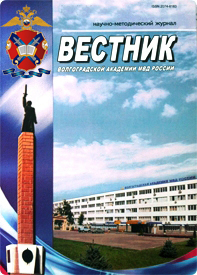The article considers the prerequisites for the creation and development of corrupt relations in pre-revolutionary Russia and the attempts made by the State to counter governmental and administrative bribery and corruption. Voluntary private compensation for officials other than the person originally had certainly legal, however, in the XIV-XV centuries it became criminal. One of the first legislative restrictions corruption belongs to Ivan the terrible, who first introduced the death penalty as punishment for redundancy in bribes. In the code of 1649, the first time meets the classification of crimes that produce malfeasance. By Peter I in January 1704, issued a Decree on the organization of the Izhora office catching fish, which first introduced the punishment for the mere fact of taking bribes. In the legislation of Catherine II, Alexander I, Alexander III and other rulers attempted to fight corruption in fiscal bodies that were on the financial support of the state, and receiving a handsome salary. In the reign of Nicholas I was adopted the Code of 1845 «About punishments of criminal and Executive» which provides for criminal liability for bribery, the penalty for the Commission of which was expressed in a monetary penalty, twice more against the price received. In addition, indicated two forms of receiving a bribe: a bribe-thanks and bribe-bribery. For the bribery of officials of public authorities and management, in addition to monetary penalties, were subjected to and release from office. The development of these rules in the Decree of Alexander II, issued in November 1862, «On finding the cause and providing the tools to eradicate this ulcer». «The penal code» 1903 formulated a definition officials. Was introduced qualifying attributes such as the Commission of a crime by the employee. This feudal serfdom legal act for a long time I've experienced a serf system, and many articles of this Law was in force until 1917.
Russia, corruption, bribe, message, history
1. Gladkih V. I. Korrupciya v Rossii: genezis, determinanty i puti preodoleniya // Ros. sledovatel'. 2001. № 3.
2. Gramoty Velikogo Novgoroda i Pskova // Akty arheograficheskoy ekspedicii Akademii nauk. T. 1. № 13.
3. Rossiyskoe zakonodatel'stvo X¾XX vekov. M., 1985.
4. Sudebniki XV¾XVI vv. M., 1952.
5. Man'kov A. G. Ulozhenie 1649 goda. Kodeks feodal'nogo prava Rossii: monogr. Leningrad, 1980.
6. Tomsinov V. A. Sobornoe ulozhenie 1649 goda kak pamyatnik russkoy yurisprudencii // Sobornoe ulozhenie 1649 goda. Zakonodatel'stvo carya Alekseya Mihaylovicha / sost., avtor predisl. i vstup. st. V. A. Tomsinov. M., 2011. S. 1¾51.
7. Serov D. O. Protivodeystvie vzyatochnichestvu v Rossii: opyt Petra I (zakonodatel'nye, pravoprimenitel'nye i organizacionnye aspekty) // Ugolovnoe pravo. 2004. № 4. S. 2¾4.
8. Rossiyskiy gosudarstvennyy arhiv drevnih aktov. F. 160. 1700 g. № 3. L. 1.
9. Demidova N. F. Sluzhilaya byurokratiya v Rossii XVII v. i ee rol' v formirovanii absolyutizma. M., 1987. S. 141¾145.
10. Davies B. The Politics of Give and Take: Kormlenie as Service Renumeration and Generalized Exange, 1488¾1726 // Culture and Identity in Muscovy, 1359¾1584. M., 1997. P. 49¾61; Enin G. P. Voevodskoe kormlenie v Rossii v XVII veke (Soderzhanie naseleniem uezda gosudarstvennogo organa vlasti). SPb., 2000. S. 49¾90.
11. Polnoe sobranie zakonov Rossiyskoy imperii s 1649 goda. SPb., 1830. T. 4. S. 52, 89, 135, 136. 240, 292, 295, 778.
12. Robinovich N. O. O nakazuemosti vzyatochnichestva i lihodatel'stva // Pravo. 1916.
13. Solov'ev S. M. Istoriya Rossii s drevneyshih vremen. T. 14. Kn. 7.
14. Rossiyskiy gosudarstvennyy arhiv drevnih aktov, F. 248. Kn. 1885. L. 155 ob.¾156. Kn. 1886. L. 124 ob.
15. Anisimov E. V. Rossiya bez Petra. SPb., 1914.
16. Anisimov E. V. Gosudarstvennye preobrazovaniya i samoderzhavie Petra Velikogo v pervoy chetverti XVIII veka. SPb., 1997.
17. Sedov P. V. «Na posule, kak na stule». Iz istorii rossiyskogo chinovnichestva XVII v. // Zvezda. 1998 g. № 4.
18. Rossiya i korrupciya: kto kogo? / G. A. Satarov [i dr.] // Ros. gaz. 1998. 19 fevr.
19. Ulozhenie o nakazaniyah ugolovnyh i ispravitel'nyh. SPb., 1845. St. 394.
20. Zakonodatel'stvo perioda stanovleniya absolyutizma. T. 4. S. 386, 387.
21. Volzhenkin B. V. Otvetstvennost' za vzyatochnichestvo po rossiyskomu ugolovnomu zakonodatel'stvu vtoroy poloviny HIX ¾ nachala HH vv. // Pravovedenie. 1991. № 2.
22. Kuvaldin V. P. Kak russkie cari borolis' s lihoimstvom // Chistye ruki. 1999. №1.
23. Tagancev N. S. Ugolovnoe ulozhenie 22 marta 1903 g.: Stat'i, vvedennyya v deystvie. SPb., 1911.
24. Esipov V. V. Ugolovnoe ulozhenie 1903 goda, ego harakter i soderzhanie. Varshava, 1903.
25. Balybin V. A. K istorii Ugolovnogo ulozheniya 1903 g. // Ekonomika, filosofiya, pravo. 1977. № 11.
26. Rossiyskoe ugolovnoe pravo. Obschaya chast' / pod red. V. S. Komissarova. SPb., 2005.
27. Kuzovkov Yu. V. Mirovaya istoriya korrupcii. M., 2010. Kn. 3.









